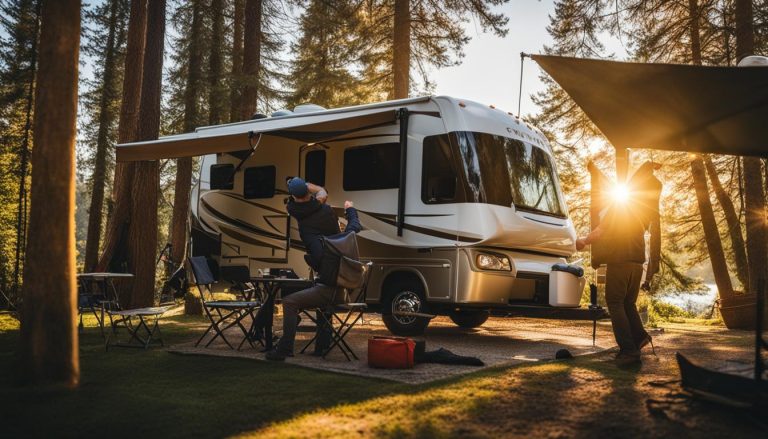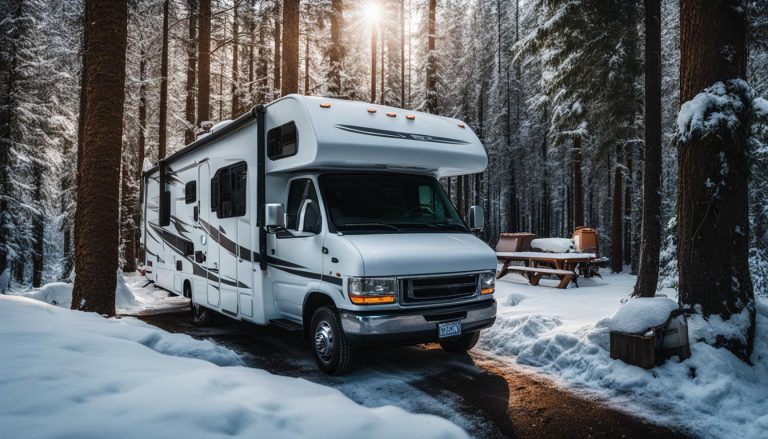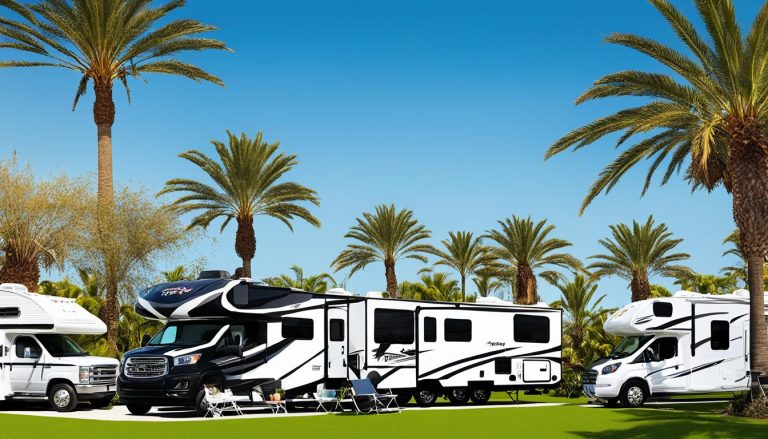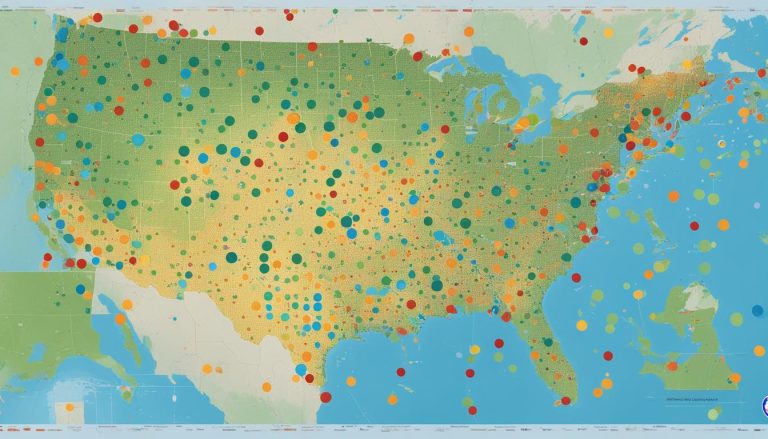Stay Connected: How to Get Internet in an RV Safely
gorvlifestyle.com and its partners may earn a commission if you purchase a product through one of our links
Are you planning a road trip in your RV and wondering how to stay connected to the internet while on the go? With the increasing importance of being online for work, staying connected with loved ones, and enjoying entertainment on the road, having reliable internet access in your RV has become a necessity. In this article, we will explore different RV internet options and provide helpful tips to ensure you can stay connected safely and securely.
When it comes to getting internet in your RV, there are several options you can consider. The best choice for you will depend on your specific needs and preferences. Let’s take a closer look at some of the most popular RV internet solutions.
Key Takeaways:
- There are various options to get internet in an RV, including cellular data, public Wi-Fi, satellite internet, and cable/DSL.
- Using cellular data and setting up a mobile hotspot is a flexible and convenient way to access the internet in your RV.
- Public Wi-Fi offered at campgrounds and RV parks can be an option, but it may not always provide reliable or fast internet speeds.
- Satellite internet is ideal for remote or rural areas, but it has data caps and may require specific equipment installation.
- Cable and DSL internet may be available at some RV parks if you plan to stay in one location for an extended period.
Now that we know there are different options available, let’s dive deeper into each one and explore the details of setting up internet in your RV. Whether you’re a digital nomad, a retiree seeking connectivity, or a family on vacation, we have the information you need to make an informed decision.
Using Cellular Data
One option for getting internet in your RV is using cellular data. This involves using your smartphone or a dedicated mobile hotspot device to create a Wi-Fi network for your devices to connect to. You can also enhance your cellular signal with an RV internet booster or signal booster to improve internet speeds. This option provides flexibility and convenience, allowing you to stay connected wherever you have cell service.
When using cellular data, your RV becomes a portable Wi-Fi hotspot, giving you the ability to connect your devices, such as laptops, tablets, and smart TVs, to the internet. By utilizing your cellular data plan, you can access the internet and stay connected even while on the move.
If you don’t have a mobile hotspot device, you can use your smartphone to create a Wi-Fi network. Simply enable the “mobile hotspot” or “tethering” feature in your phone’s settings, and other devices can connect to it just like any other Wi-Fi network. Keep in mind that using your smartphone as a hotspot may consume additional battery power, so it’s a good idea to have a charger handy.
To ensure a strong and reliable cellular signal, you can utilize an RV internet booster or signal booster. These devices amplify the existing cellular signal, improving internet speeds and connectivity. They are particularly useful in remote or rural areas where the signal may be weaker. By boosting the signal, you can enjoy faster browsing, smoother streaming, and better overall internet performance.
Tip: If you’re planning to rely on cellular data for internet access in your RV, consider investing in a mobile data signal booster. This can significantly improve your internet experience, especially in areas with weak cell coverage.
Using cellular data gives you the freedom to stay connected on the road, whether you’re camping in a remote location or traveling through different cities. It’s important to choose a reliable cellular carrier and a suitable mobile data plan that fits your data needs. Some carriers also offer special plans or discounts for RVers, so be sure to explore your options to find the best fit for your internet usage.
Public Wi-Fi
Another option for getting internet in your RV is using public Wi-Fi. Many campgrounds and RV parks offer free Wi-Fi for guests. However, the quality and reliability of campground Wi-Fi can vary, and it may not be suitable for intensive internet usage like streaming or video conferencing. Using RV Wi-Fi extenders can help boost the Wi-Fi signal in the campground and improve your internet experience.
If you choose to rely on public Wi-Fi, here are a few things to keep in mind:
- Check with the campground or RV park about their Wi-Fi availability and any limitations or restrictions.
- Understand that public Wi-Fi networks may be shared by many users, which can impact internet speeds.
- Consider investing in RV Wi-Fi extenders to enhance the Wi-Fi signal and increase range.
RV Wi-Fi extenders are devices that capture and amplify the Wi-Fi signal, allowing you to access Wi-Fi from a greater distance. These extenders can help improve signal strength and coverage in your RV, making it easier to connect to the campground’s Wi-Fi network.
When choosing an RV Wi-Fi extender, look for one that is compatible with the Wi-Fi frequencies used by the campground or RV park. Some extenders can also work with cellular data networks, giving you more options for staying connected.
It’s important to note that while RV Wi-Fi extenders can improve signal strength, they cannot guarantee a fast or stable internet connection. The speed and reliability of the Wi-Fi will still depend on the campground’s network infrastructure and the number of users connected.
Here’s an example of a popular RV Wi-Fi extender:
| RV Wi-Fi Extender | Description | Price |
|---|---|---|
| Alfa Wi-Fi Camp Pro 2 | The Alfa Wi-Fi Camp Pro 2 is a long-range Wi-Fi extender designed specifically for RVers. It includes a high-gain Wi-Fi antenna and a router to boost and share the Wi-Fi signal in your RV. | $149.99 |
Using an RV Wi-Fi extender can help you make the most of campground Wi-Fi and stay connected while on the road. Just remember that public Wi-Fi networks may not always provide the same level of speed and reliability as dedicated cellular data or satellite internet.
Satellite Internet
If you’re looking for internet access in remote or rural areas, satellite internet may be the best option for your RV. Providers like Viasat and HughesNet offer satellite internet plans specifically designed for RVers. Satellite internet requires installing a satellite dish on your RV and may have data caps or slower speeds during peak usage times. However, it provides reliable internet access in areas where other options may not be available.
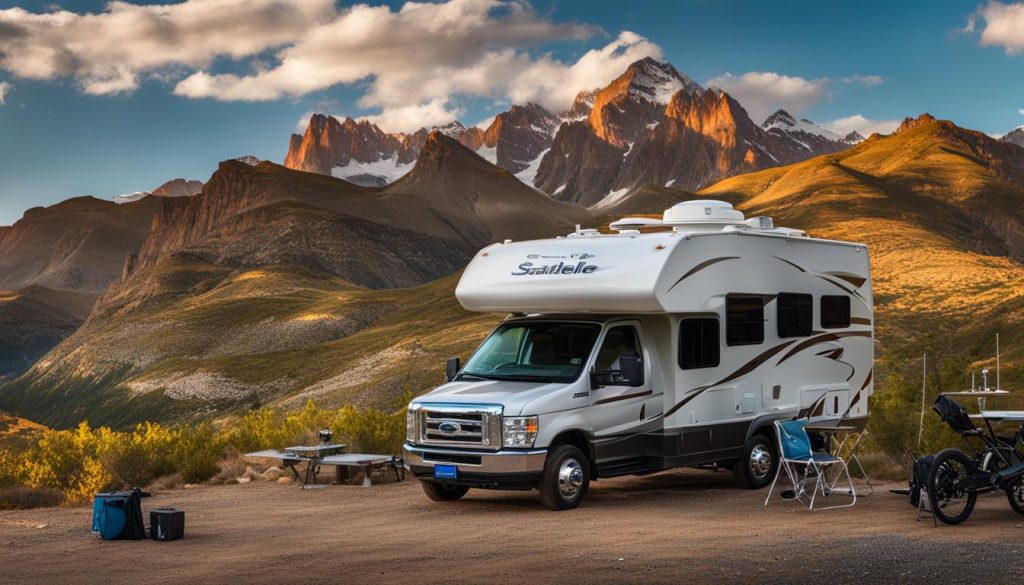
- Contact a satellite internet provider like Viasat or HughesNet to sign up for a plan that suits your needs.
- Arrange for the installation of a satellite dish on your RV. This usually involves mounting the dish on the roof or side of your RV and ensuring it has a clear line of sight to the sky.
- Connect your devices to the satellite internet network using a modem or router provided by the satellite internet provider.
With satellite internet, you can enjoy internet access in even the most remote locations, allowing you to stay connected and work, stream, or communicate with family and friends while on the road.
Cable and DSL
If you plan to stay parked in one location for an extended period, you may be able to access cable or DSL internet service in your RV. Some RV parks and campgrounds offer these options for long-term guests. Cable and DSL provide fast and reliable internet access, similar to what you would have in a traditional home. However, this option is not suitable for RVers who are constantly on the move.
Choosing the Right Option
When it comes to setting up internet in your RV, choosing the right option is crucial. Consider factors such as your travel plans, internet usage, and budget to make an informed decision. Whether you prefer a mobile data plan, cellular carrier, or satellite internet provider, conducting thorough research will ensure you find the best fit for your needs.
Research Mobile Data Plans and Cellular Carriers
Start by researching different mobile data plans and cellular carriers to identify the one that offers optimal coverage and data options for your RV. Look for plans that have extensive coverage in the areas you plan to travel to, ensuring a strong and reliable internet connection on the road. Compare data allowances, speeds, and pricing to find the best value for your budget.
Consider Satellite Internet Providers
If you require internet access in remote or rural areas, satellite internet may be the ideal solution for your RV. Providers like Viasat and HughesNet offer satellite internet plans specifically designed for RVers. Compare the plans and prices offered by these providers to determine which one aligns with your internet needs and budget. Keep in mind that satellite internet may have data caps or slower speeds during peak usage times, so factor these limitations into your decision.
Evaluate Location, Data Needs, and Equipment
When choosing the right option for your RV internet setup, it’s important to consider your location, data needs, and the equipment required for each option. Are you frequently traveling to remote areas with limited cellular coverage? Are you a heavy internet user who streams videos and participates in video conferences? Understanding your specific requirements will help you make an informed decision.
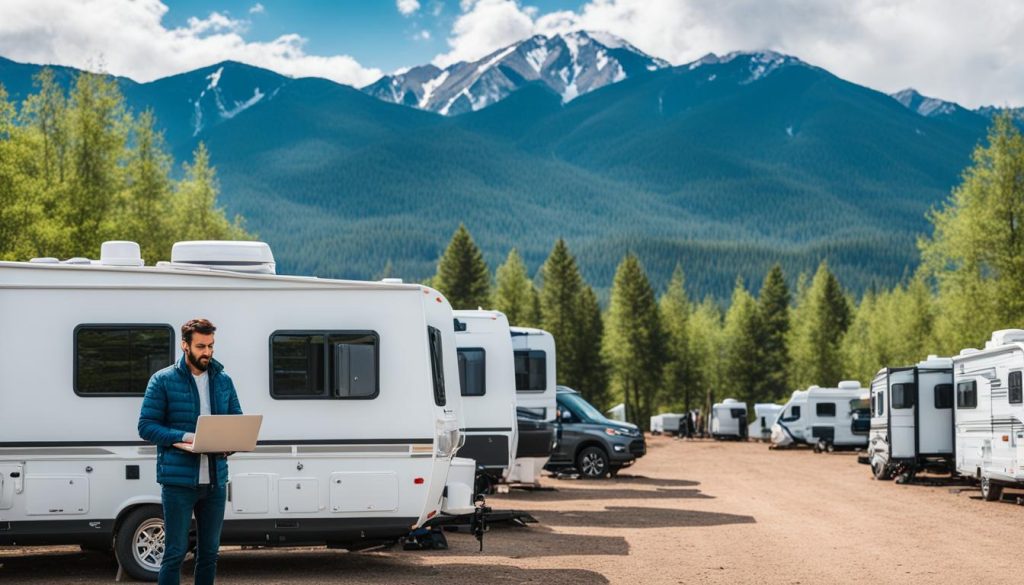
By carefully evaluating your options and considering all relevant factors, you can choose the best RV internet setup for your needs. Finding the right mobile data plan, cellular carrier, or satellite internet provider will ensure you stay connected on the road, allowing you to work, stream, and enjoy the convenience of the internet while embracing the RV lifestyle.
Conclusion
Staying connected in an RV is essential for many travelers, whether for work or personal use. With the abundance of options available, you can easily set up a reliable internet connection to meet your needs while on the road.
By considering the different options for RV internet setup and selecting the right solution, you can enjoy seamless internet access throughout your travels. Whether you choose to rely on cellular data, connect to public Wi-Fi networks, or opt for satellite internet, staying connected will enable you to work remotely, stream your favorite shows, and stay in touch with loved ones.
Remember to research and compare different providers and plans to find the one that offers the best coverage, speed, and pricing for your specific needs. Additionally, make sure to invest in any necessary equipment, such as mobile hotspots, signal boosters, or satellite dishes, to optimize your internet access.
With a well-planned RV internet setup, you can confidently embark on your adventures knowing that you’ll have internet access whenever and wherever you need it. Enjoy the freedom and flexibility of the RV lifestyle while staying connected to the digital world.
FAQ
How can I get internet in my RV?
There are several options for getting internet in your RV. You can use cellular data from a provider, connect to public Wi-Fi networks, use satellite internet, or access cable and DSL service in certain RV parks and campgrounds.
What is the best option for getting internet in an RV?
The best RV internet solution depends on your connectivity needs and how you plan to use the internet while on the road. If you need flexibility and convenience, using cellular data with a mobile hotspot device or your smartphone may be the best option. If you’re in remote areas, satellite internet could be the most reliable choice. If you plan to stay in one location, accessing cable or DSL internet service may be ideal.
How does using cellular data work for RV internet?
Using cellular data involves using your smartphone or a dedicated mobile hotspot device to create a Wi-Fi network for your devices to connect to. This allows you to stay connected wherever you have cell service. You can also enhance your cellular signal with an RV internet booster or signal booster to improve internet speeds.
Can I use public Wi-Fi in RV parks or campgrounds?
Yes, many campgrounds and RV parks offer free Wi-Fi for guests. However, the quality and reliability of campground Wi-Fi can vary. It may not be suitable for intensive internet usage like streaming or video conferencing. Using RV Wi-Fi extenders can help boost the Wi-Fi signal in the campground and improve your internet experience.
What is satellite internet, and how does it work for RVs?
Satellite internet is an option for RVers who need internet access in remote or rural areas. Providers like Viasat and HughesNet offer satellite internet plans specifically designed for RVers. Satellite internet requires installing a satellite dish on your RV and may have data caps or slower speeds during peak usage times. However, it provides reliable internet access in areas where other options may not be available.
Can I access cable or DSL internet service in my RV?
If you plan to stay parked in one location for an extended period, you may be able to access cable or DSL internet service in your RV. Some RV parks and campgrounds offer these options for long-term guests. Cable and DSL provide fast and reliable internet access, similar to what you would have in a traditional home. However, this option is not suitable for RVers who are constantly on the move.
How do I choose the right option for getting internet in my RV?
When choosing the best RV internet setup for your needs, consider factors such as your travel plans, internet usage, and budget. Research different mobile data plans and cellular carriers to find the one that offers the best coverage and data options for your RV. If satellite internet is your preferred option, compare the plans and prices of providers like Viasat and HughesNet. Take into account your location, data needs, and the equipment required for each option.
Why is staying connected in an RV important?
Staying connected in an RV is essential for many travelers, whether for work or personal use. By having internet access, you can work remotely, stream entertainment, stay connected with family and friends, and access important information while enjoying the freedom and adventure of the RV lifestyle.

